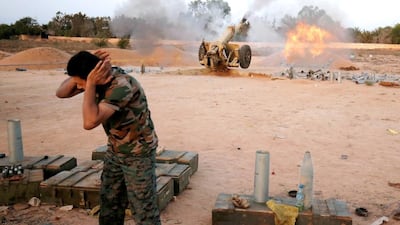A wave of protests have erupted in Tripoli against the country’s United Nations-backed government, overshadowing its success in finally occupying the prime minister’s office three months after arriving in the capital.
The people’s anger at the government’s failure to tackle shortages of electricity, water and money, coupled with endemic militia violence, saw tyres set alight in several districts and roads blocked on Tuesday.
Seemingly oblivious to the anger on the streets, a red carpet was rolled out for the seven-man presidency of the Government of National Accord as the members entered the official prime minister’s office, ending the 103 days they spent confined to Tripoli naval base amid fears of militia violence.
Since arriving on March 30 the GNA, led by prime minister Fayez Al Sarraj, has failed to end Libya’s civil war, which began in July 2014. The capital’s administration is dislocated and basic services are breaking down.
Fuel delivery shortages mean power plants cannot generate enough electricity. Tripoli districts are rationed to one hour of power in twelve, causing anger as the capital swelters in baking heat.
Among Tuesday’s protests, armed demonstrators took over the state telecoms headquarters, demanding phone services be cut to the towns of Zawiya and Misurata as punishment for their alleged hogging of electricity supplies.
Second to the issue of power shortages is that of money. Last month the Central Bank of Libya took delivery of 112 million dinars in banknotes, but fearing inflation local banks only issue small amounts. “My father spent six hours waiting in a line outside his bank, and all he was given was 300 dinars (Dh780),” said one Tripoli engineer.
Bread prices have risen five-fold in recent months, while the Libya Observer online newspaper reports the dollar selling at 4.35 dinars on the black market, compared to 1.3 dinars at the official rate.
Meanwhile, there are daily skirmishes over city territory, with recent battles seeing Tripoli militias fighting those from Misurata.
The militias are the biggest stumbling block to any chance the new government has of success. Some were formed during the 2011 revolution to fight against Muammar Qaddafi, with allegiances based on towns or Tripoli districts or political affiliations. They range in size and power from Rada, a self-declared Tripoli police force, to smaller units, some no more than criminal gangs and they have turned Tripoli and indeed the whole of Libya into a patchwork quilt of territories. They have also made sure that the central bank pays their salaries.
Evidence of the continuing power of the militias came in May when a court decided that a dozen former officials of the Qaddafi regime could be set free from two militia-controlled city jails. The day after they were due to be released, all 12 were found dead. Both the GNA and Attorney General promised investigations, but a month later nobody has been charged, highlighting the impunity of the militias.
The GNA was created in December, with the backing of the UN Security Council, to replace two warring parliaments, the Tripoli-based General National Congress and the elected House of Representatives in Tobruk.
But Tobruk continues to ignore the new government, and is taking steps to divorce itself from central control.
In May, Tobruk tried to sell its own oil rather than send the profits to Tripoli. When this was blocked by the UN, it began a two-week blockade of the main eastern port at Tobruk.
Last month Tobruk issued its own currency, printed in Russia, even as the Tripoli central bank issued British-printed banknotes. The powerful Tobruk army of General Khalifa Haftar has refused to even acknowledge Mr Sarraj as prime minister.
In Tripoli, large parts of the GNC have defected to support the GNA, but there is a feeling in the city that this is a question of the tail wagging the dog — Mr Sarraj is obliged to follow the orders of militias and GNC ministries, not the other way around. Adding to the confusion, GNC prime minister Khalifa Ghweil says the GNA’s arrival in government offices is illegal and has promised to sue to get his office back.
Mr Sarraj’s most intractable problem is that his government was not elected, while the Tobruk parliament was. Instead, the GNA was appointed by a UN-chaired commission, Libya Dialogue, in an attempt to unify the country. Mr Sarraj, a Tripoli politician, was chosen as prime minister because he is not aligned with any one of Libya’s myriad factions and militias. But the failure to be supported by the ballot box or either of Libya’s parliaments leaves him with a tenuous claim to legitimacy.
Even Libya’s two recent successes, against ISIL, and the uniting of rival National Oil Corporations in Tripoli and Tobruk has come at a price.
The extremists have seen their self-declared caliphate smashed by Misuratan forces aligned to the GNA, which have surrounded the ISIL base at Sirte.
Meanwhile, Tripoli and Tobruk versions of the National Oil Corporations have merged, hoping to raise oil production now at a quarter of pre-war levels.
But both the ISIL offensive and the oil deal have been accomplished by local leaders, with no reference to the GNA. Optimists say these successes are proof that Libyans can come together. Yet the failure of Mr Sarraj to impose his will on this fragmented warring country leaves him and his government becoming ever more irrelevant.
foreign.desk@thenational.ae

